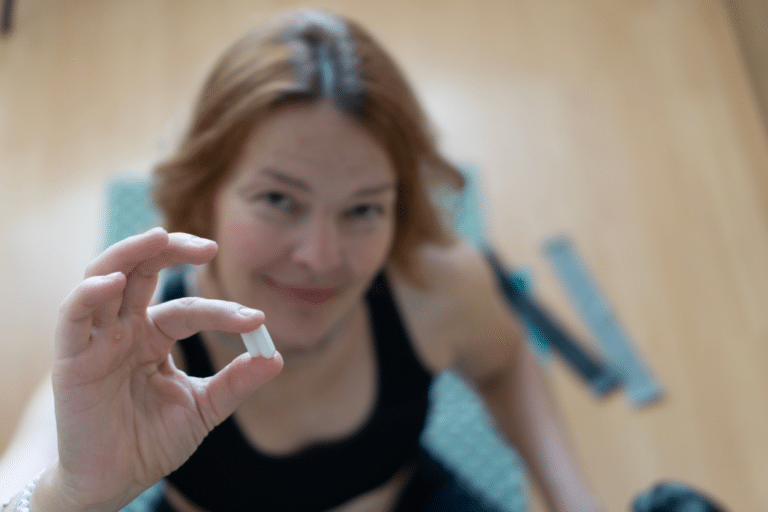Hormonal imbalances can cause a variety of complications, from mood swings to anxiety to leg cramps, and more.
And according to a recent survey of 2,000 American women ages 30 to 60, nearly half of them have experienced the symptoms of a hormone imbalance. However, 72 percent of respondents said they weren’t aware that their symptoms were related to hormone imbalances until after they have experienced them.
Stress is a major contributor to how you experience perimenopause and menopause. We’re all familiar with common symptoms related to stress. Anxiety, abdominal fat gain, heart palpitations, and insomnia are all signs that cortisol, one of your stress hormones, may be running wild. What you may not know is that there are a number of other symptoms that go along with stress.
[bctt tweet=”Hormonal imbalances can cause a variety of complications, from mood swings to anxiety to leg cramps, and more. #perimenopause #cortisol #stress #hairloss #guthealth #libido #hormonalacne #menopause #AnnaGarrettAsheville ” username=”DrAnnaGarrett”]
1.) Shorter or skipped cycles
Not much is known about the relationship between stress and periods. However, we do know that stress plays a role in suppressing the functioning of the hypothalamus; which, controls the pituitary gland which, in turn, controls the thyroid, adrenal glands, and the ovaries. They all work together to keep the delicate balance of hormones.
Acute and chronic stress can alter the body’s hormone balance, which can lead to missed, late, or irregular periods. As evidence of this, researchers have found that women in stressful jobs are at a 50 percent higher risk for short cycle length (less than 24 days) than women who do not work in high-stress positions.
2.) Hair loss
Significant emotional or psychological stress can cause a physiological imbalance which contributes to hair loss. When we’re stressed, adrenal glands produce cortisol which signals hair follicles to shift from the growth phase into catagen, a transition phase. This causes hair to fall out. If you’re losing more than 150 strands per day (it depends on the length of hair, but it should be a relatively sparse palmful) or noticing a significant change in how much hair you’re losing, stress could be to blame. Hair loss from stress may happen primarily around your temples. While you may not notice hair loss during or immediately following a period of stress, the changes can occur three to six months later.
In addition to stress, there are a few other reasons your hair could be falling out. Hormones, anemia, environmental factors, medications, and your diet may all play a role. If you’re seeing hair fall out in patches instead of a general shedding pattern, something other than stress is likely behind it. Hormonal hair loss tends to present as a receding hairline or widening part, and immune deregulations (like alopecia areata) will usually cause hair to fall out in patches.
3.) Acne
Chronic stress increases levels of cortisol and sends the skin’s oil glands into overdrive, which mixes with dead skin cells and breakout-causing bacteria. Adult skin is more prone to buildup of dead skin cells because natural cell turnover slows over time.
When skin is stressed, it also loses some of its ability to protect itself because its barrier becomes compromised. For adults, this can lead to further complications; such as, inflammation and premature signs of skin aging. Stress damages collagen, causing wrinkles. Cortisol lowers natural production of hyaluronic acid, which dehydrates skin and increases the appearance of fine lines. Dehydration triggers even more production of excess sebum, which creates the perfect breeding ground for breakout-causing bacteria, so drink up!
4.) Digestive disaster
Research shows that ongoing stress can negatively affect the trillions of healthy bacteria in your gut, and sub-par gut health can have a depressing effect on your entire system since the majority of neurotransmitters are made in the GI tract. Eighty percent of your immune system also lives within the inner ecosystem of the gut, affecting almost every aspect of how you feel each day. When your gut is healthy, it contains a balance of about 85% of good bacteria and 15% bad guys.
When you’re experiencing elevated stress levels, your brain goes into flight-or-fight mode, and cortisol causes havoc by impacting blood flow to the gut. This is why it’s common to experience a lull in digestive and immune health with episodes of heightened stress.
When your good microbes are weakened or damaged due to stress, the integrity of your gut lining can become compromised, resulting in “leaky gut.” This manifests as a plethora of health issues, such as:
- Chronic diarrhea, constipation, gas or bloating.
- Nutritional deficiencies.
- Poor immune system.
- Headaches, brain fog, memory loss.
- Excessive fatigue.
- Skin rashes and problems such as acne, eczema or rosacea.
- Cravings for sugar or carbs.
- Arthritis or joint pain.
Want to learn more about your own gut health? Email me at info@drannagarrett.com.
5.) Loss of sex drive
During times of stress, we need to survive, not make babies. Stress increases your body’s most important functions for survival; like, blood flow and increased heart rate, while diminishing non-essential functions; like, turning on your libido. Throw in anxiety and depression and it’s a terrible recipe for great sex. Interestingly, stress is one of those weird problems that can not only affect your sex life, but also be solved by having sex. So if you want to get rid of stress, go get busy!
Dr. Anna Garrett is a menopause expert and Doctor of Pharmacy. She helps women who are struggling with symptoms of perimenopause and menopause find natural hormone balancing solutions so they can rock their mojo through midlife and beyond. Dr. Anna is the author of Perimenopause: The Savvy Sister’s Guide to Hormone Harmony. Order your copy at www.perimenopausebook.com.
Dr. Anna is available for 1-1 consultations. Find out more at www.drannagarrett.com/lets-




